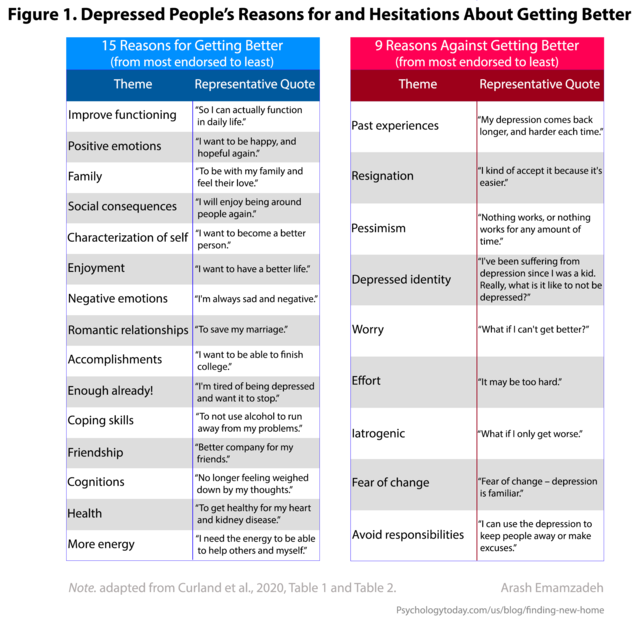Depression
Depression: 15 Reasons for Getting Better
Research examines reasons depressed people give for and against getting better.
Posted September 22, 2020 Reviewed by Abigail Fagan

New research published in the July issue of Clinical Psychologist, discusses 15 reasons people with depression give for wanting to get better—in addition to nine hesitations related to getting better.
Sample and methods
Participants were recruited, mainly using Google Ads, to participate in an online intervention for depressive symptoms. Eligibility criteria consisted of age (18 years or older), Internet access, and English fluency. The sample comprised 232 individuals (average age of 34 years; 25 percent men). Measures used included demographic questionnaires, the Quick Inventory of Depressive Symptomatology-Self-Report (QIDS), and an assessment of reasons for and against trying to get better.
This last measure consisted of statements related to common reasons depressed individuals might want to (or not want) to improve. It also asked participants to describe their own reasons for and against change.
An analysis of the responses to the QIDS, the self-report depression questionnaire, showed an average score of 16 (5-26 range), with nearly 88 percent of participants having moderate or severe depression.
15 Motivations for Getting Better and 9 Reasons to Hesitate
Analyzing the sample’s responses regarding reasons for and against change revealed a variety of motivations. These motivations, along with the percentages of those who endorsed them, are listed below.
- Increase productivity and functioning (33 percent)
- Experience positive emotions, like hope and happiness (27 percent)
- Honor family commitments (24 percent)
- Ameliorate social interactions (22 percent)
- Improve oneself (21 percent)
- Experience more enjoyment (21 percent)
- Reduce the intensity of unpleasant emotions (16 percent)
- Better one’s romantic relationships (16 percent)
- Achieve important goals (15 percent)
- Change due to feeling tired of being depressed (11 percent)
- Learn more effective coping skills (10 percent)
- Improve relationships with friends (10 percent)
- Be free of negative thoughts (9 percent)
- Better one’s health (9 percent)
- Have more energy (6 percent)
9 reasons for not wanting to get better
- Negative experiences with treatments for depression (24 percent)
- Having given in to depression (23 percent)
- Pessimism about any treatment helping (22 percent)
- Viewing depression as a part of one’s identity (19 percent)
- Numerous “what if” worries and fears (19 percent)
- Effort needed for improvement being too great (18 percent)
- Negative complications of diagnosis and treatment (13 percent)
- Fear of change (12 percent)
- Avoidance of responsibilities of a more social or productive life (10 percent)
See Figure 1 for representative quotes for each type of motivation.

In terms of reasons to get better, people commonly endorsed reasons related to social, emotional, and functional concerns.
Many people with depression reported wanting to change for social reasons (e.g., family commitments, romantic and friend relationships). The strongest motivations for wanting to get better were to regain the ability to experience a full range of emotions and to be productive again. An even more prevalent theme concerned improving one’s quality of life (e.g., more enjoyment, increased positive and reduced negative emotions).
The concern with one’s quality of life was also present among reasons for not wanting to get better (e.g., the fear that the treatment could lower one’s quality of life even further).
As for reasons for not wanting to get better, some participants believed it impossible or improbable to return to pre-depression levels of enjoyment, life quality, and functioning. These views are captured by the second and third most common reasons against wanting to get better: resignation and pessimism.
How can one counter such hesitations to seek help and get better?
Social reasons, like the realistic possibility of better relationships and potential benefits to others (e.g., one’s family members and friends) might be quite motivating. Yes, isolation, loneliness, and withdrawal from life may have become habitual for many depressed individuals, but reminders about how others matter to them and they too matter to others can help them begin to break these habits.
The authors suggest that since a considerable number of people with depression do not seek care—or see a health professional only once—one potential intervention is “inoculating” these depressed individuals “against common reasons against improvement by explicitly discussing [these reasons] and offering corrective feedback.”
In addition, “public health campaigns might offer educational and motivational messages for individuals suffering from depression that are in line with common reasons to seek care; such campaigns may also address misconceptions about treatment.”
Facebook image: shisu_ka/Shutterstock


